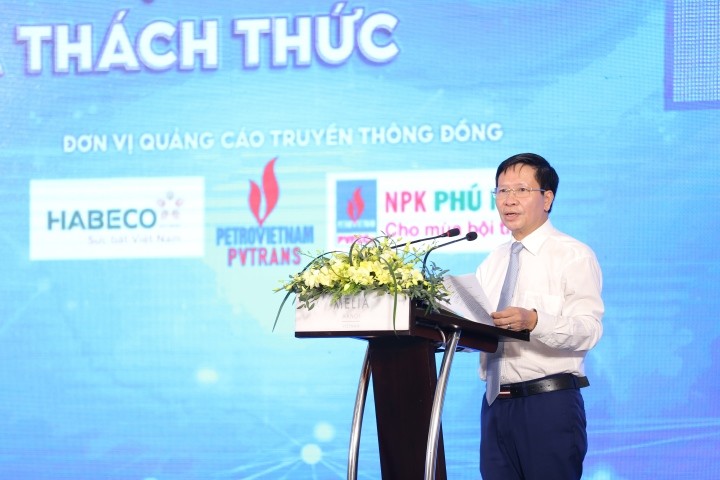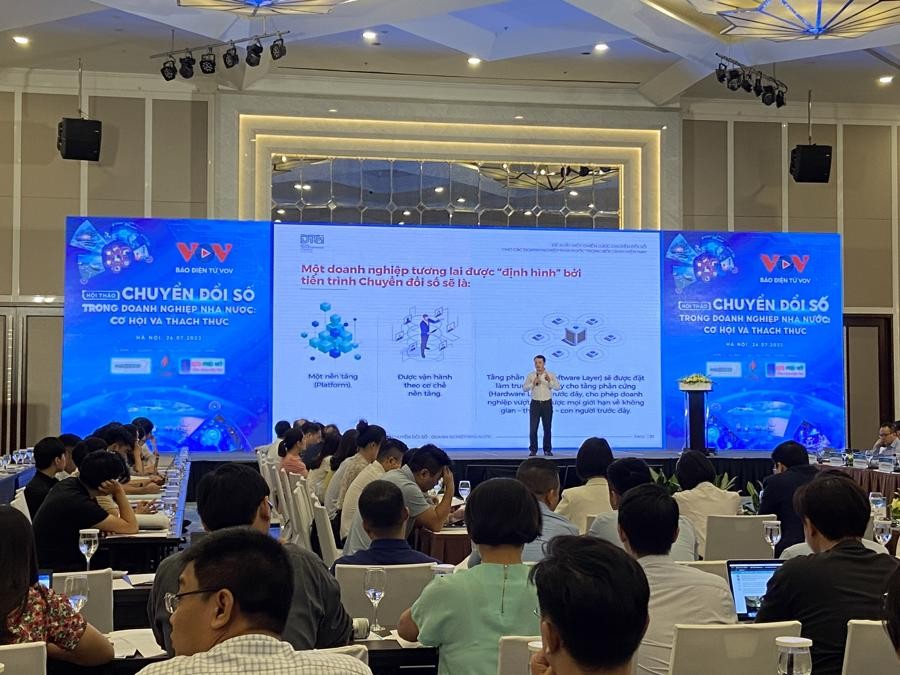This is also the main content mentioned and discussed by many experts at the Workshop "Digital transformation in state-owned enterprises: Opportunities and challenges" on July 26 in Hanoi . The workshop was organized by VOV Online Newspaper in coordination with relevant agencies.
Inevitable trend
Speaking at the opening of the workshop, Mr. Vu Hai Quang, Deputy General Director of Voice of Vietnam, said that digital transformation is an inevitable trend in today's era, opening up unprecedented opportunities for localities and businesses around the world to rise up in the Industrial Revolution 4.0, helping governments of countries operate more effectively and transparently.
Digital transformation consists of three pillars: Digital Government, Digital Economy and Digital Society. In addition to the effectiveness of Digital Government, Digital Economy promotes innovation, creates new values, helps increase labor productivity, and creates new growth momentum.
Recognizing the importance of digital transformation, many countries have developed and implemented national strategies and programs on digital transformation. The content of digital transformation varies from country to country, depending on the socio-economic development strategy of each country. In Vietnam, in recent times, there have been many important guidelines, policies, and orientations for the digital transformation roadmap.
 |
| Mr. Vu Hai Quang, Deputy General Director of Voice of Vietnam, delivered the opening speech at the Workshop. (Photo: Hong Chau) |
Mr. Vu Hai Quang said that the Industrial Revolution 4.0 with the appearance of IoT, Big Data, AI, Icloud has marked a remarkable development in the use of data in social activities, especially in the field of production and business. In that context, the digital economy is becoming an inevitable development trend, being researched, applied and developed by many countries.
"For Vietnam, developing the digital economy is a great opportunity to narrow the development gap. In recent years, the application of digital technology in production and business has brought development opportunities to many countries and Vietnam is no exception. However, the number of businesses that have succeeded in digital transformation in Vietnam is not much, especially the leading businesses that lead the country's economy," Mr. Quang pointed out.
Therefore, according to Mr. Quang, the Workshop on digital transformation in state-owned enterprises is a very necessary and meaningful activity to help businesses get more advice from experts, scientists and experience of businesses that have succeeded in digital transformation. The workshop also contributes to concretizing the major policies of the Party and State on digital transformation in the coming period.
6 major barriers
Mr. Le Nguyen Truong Giang, Director of the Institute of Digital Transformation Strategy, Vietnam Digital Communications Association, emphasized that digital transformation is a process, not a model or method. Therefore, there is no specific digital transformation model or method that is suitable and appropriate for all businesses and organizations. Looking at the current state of digital transformation in the state-owned enterprise sector, Mr. Giang said that digital transformation in this sector is facing many difficulties and 6 major barriers:
Firstly, this business sector has very strict legal corridors, regulations, rules and control methods. This is a factor that creates barriers in transforming the organizational method for digital transformation, because you cannot transform however you want, and you cannot transform immediately, and the transformation is also subject to many constraints, making it difficult to transform successfully.
Second, due to the difficulty of transforming the organizational model, this process itself also creates many difficulties in building a digital transformation roadmap, especially in building new business models or deploying business model ecosystems.
Third, the transformation of operations also generates large investments and the characteristic of tight control over the investment process leads to slow decision-making time and many procedures, making it difficult to build digital initiatives according to the "Agile" rapid development model or build new investment ecosystems for testing due to the lack of legal corridors for this process.
 |
| Mr. Le Nguyen Truong Giang, Director of the Institute of Digital Transformation Strategy, Vietnam Digital Communications Association, shared at the Workshop. (Photo: Hong Chau) |
Fourth, digital transformation also requires a holistic view, a holistic approach, and is only successful and effective with the overall impact of all transformation elements working together. However, this is a major obstacle in the decision-making mechanism at state-owned enterprises.
To ensure certainty, most of the current digital solutions and initiatives are focusing on solutions based on a detailed analysis of advantages and disadvantages, thereby building an overall design and a detailed design according to the “waterfall” model. Therefore, instead of creating an overall impact, digital transformation in state-owned enterprises is currently focusing more on the process of digitizing operations and building a number of specific solutions instead of the whole.
Fifth, at present, digital transformation is mostly just at the planning stage, the issue of implementation, especially at lower levels of the organization, is a major bottleneck. Therefore, it has not really created a dynamic competitive advantage for state-owned enterprises through the digital transformation process.
Sixth, the digital transformation process also faces obstacles in the legal corridor regarding processes, regulations, and mechanisms for changing and applying organizational models, business models, data models, operating models, etc.
It is this lack of architecture that leads to digital transformation not maximizing its advantages in the process of applying them to actual operations to fundamentally and comprehensively transform the enterprise to a new business nature - becoming a digital enterprise.
According to Mr. Nguyen Thanh Tuyen, Deputy Director of the Department of Information Technology Industry (Ministry of Information and Communications), digital transformation is still facing many difficulties such as high investment costs for digital transformation, "the first problem is where is the money".
In addition, businesses also have business habits that are difficult to change; lack of commitment from leaders; or even a situation where "the top directs, the bottom does not listen, lack of commitment from employees", lack of internal human resources, lack of infrastructure, lack of digital technology information, lack of clear digital transformation roadmap... All of these factors are hindering the digital transformation process in businesses.
Source











































































































Comment (0)